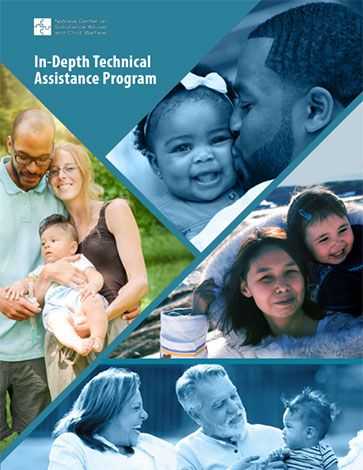In-Depth Technical Assistance
NCSACW's In-Depth Technical Assistance (IDTA) program enables states, Tribes, and their community partner agencies to better improve the safety, health, permanency, well-being, and recovery outcomes for families affected by substance use and co-occurring mental health disorders. The program also helps states develop policies and protocols related to: 1) infants born and identified as being affected by prenatal substance exposure, and 2) the development of Plans of Safe Care (POSC).
The 18- to 24-month program achieves this objective by facilitating collaboration across agencies serving children and families. Agencies include substance use and mental health disorder treatment centers; child welfare and court systems; as well as public health, health care, and early intervention providers. NCSACW has provided IDTA to 31 sites since 2003.
The IDTA model and its strategic, phased approach operates on the premise that communities are more likely to implement meaningful and sustainable policy and practice change when they receive targeted training, technical assistance, and coaching in sufficient depth and duration. A dedicated change liaison provides tailored services throughout the engagement.

View Site Profiles
To view a state profile, select a state or territory
undefined (undefined)
past
- |
current
- |
Show All
No Results
Highlighted Resource
In-Depth Technical Assistance Program Description

National Center on Substance Abuse and Child Welfare, 2022
Provides an overview of the National Center on Substance Abuse and Child Welfare’s (NCSACW) In-Depth Technical Assistance (IDTA) program
...(Read More)Reports
Infants with Prenatal Exposure Initiative Final Report 2016–2018
National Center on Substance Abuse and Child..., 2020
Summarizes the work of Delaware, New York, and Minnesota through the In-Depth Technical Assistance-Infants with Prenatal Substance
... (Read More)In-Depth Technical Assistance: Final Report 2007-2012
National Center on Substance Abuse and Child..., 2013
Provides an overview of the IDTA program model, sites served (and their accomplishments), and lessons learned in facilitating systemic
... (Read More)In-Depth Technical Assistance: Round Three Final Report
National Center on Substance Abuse and Child..., 2007
Summarizes the interventions, outcomes, and lessons learned in this third round of the IDTA program that built on the lessons learned
... (Read More)In-Depth Technical Assistance: Round Two Final Report
National Center on Substance Abuse and Child..., 2006
Summarizes the interventions, outcomes, and lessons learned in this second round of the IDTA program that built on the experience
... (Read More)In-Depth Technical Assistance: Round One Final Report
National Center on Substance Abuse and Child..., 2005
Summarizes the interventions, outcomes, and lessons learned in the initial round of the IDTA program.
... (Read More)Policy and Practice Resources
Building Hope for Families Affected by Substance Use and Mental Health Disorders: A Blueprint for an Effect...
National Center on Substance Abuse and Child..., 2023
This series describes concrete strategies collaboratives can use to enhance the system of care while improving outcomes for families
... (Read More)In-Depth Technical Assistance Program Description
National Center on Substance Abuse and Child..., 2022
Provides an overview of the National Center on Substance Abuse and Child Welfare’s (NCSACW) In-Depth Technical Assistance (IDTA) program
... (Read More)Brief Focused Technical Assistance Description
National Center on Substance Abuse and Child..., 2022
Provides an overview of the National Center on Substance Abuse and Child Welfare’s (NCSACW) Brief Focused Technical Assistance (BFTA
... (Read More)In-Depth Technical Assistance: Infants with Prenatal Substance Exposure
National Center on Substance Abuse and Child..., 2019
Summarizes the accomplishments, key findings, and conclusions that emerged from three In-Depth Technical Assistance (IDTA) Infants with
... (Read More)Related Online Training, Videos, and Webinars
Specialized Technical Assistance Programs Overview
Date: September 20, 2022
This pre-recorded webinar highlights two of the National Center on Substance Abuse and Child Welfare’s specialized technical assistance
...(Read More)